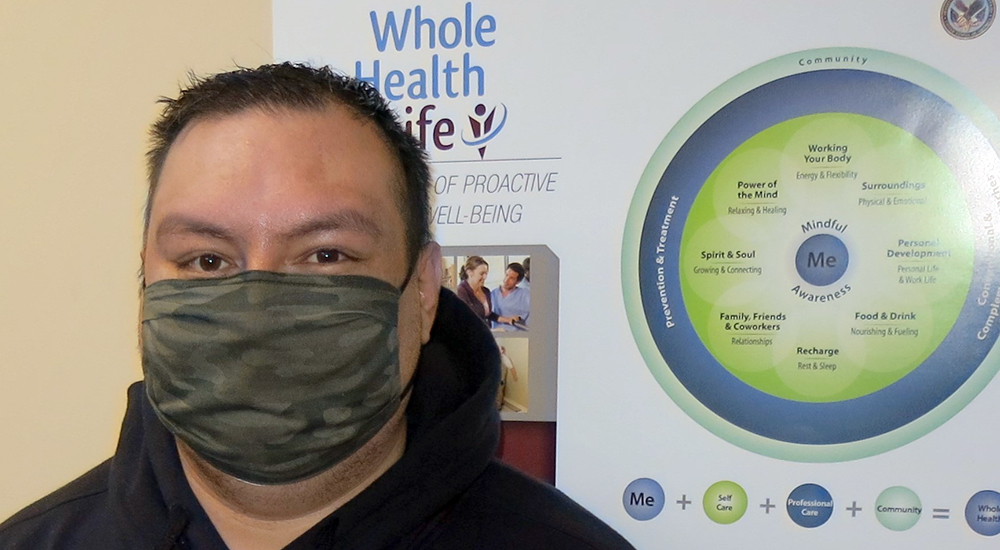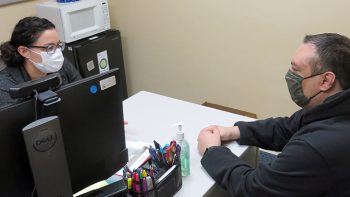Depression was ruining combat Veteran Ricardo Martinez’s life, and he knew it.
The Iraqi War Veteran had isolated himself for a year. During that time, he lost six people in his life to COVID-19.
“Everything got pushed down,” said Martinez, who served in the Army for six years, including in the 82nd Airborne Division.
During his year of isolation, the Waukegan, Ill., resident stopped taking his young daughter to the park. He feared he would lose her and his wife.
Martinez decided it was time to do something. He admitted himself to the Lovell Federal Health Care Center in North Chicago, Ill., for treatment of his PTSD.
It wasn’t the first time he sought mental health treatment. It was the fourth time he entered the PTSD program and this time he was determined not to quit. So, when Whole Health Coach Rossyvette Harrington visited Martinez soon after he was admitted and told him about Whole Health, he quickly recognized it could make the difference.
I like that you go at your own pace
“I’m open-minded,” he said. “Let’s try this. It’s up to me to see what I want to work on first. And I like that you go at your own pace.”
Lovell has implemented the Whole Health concept across the hospital, which is the first and only fully integrated VA and DoD (Navy) health care facility. We serve military patients and their families and Veterans in southeast Wisconsin and northeast Illinois.
Whole Health, which was adopted by VA in 2015, is a proactive approach to health care. It equips, empowers and treats patients, allowing them to discover what matters most to them so that they can live their lives to the fullest.
“What I find most fulfilling about the Whole Health approach to care and Whole Health coaching is offering patients the opportunity to tell their story,” Harrington said. “When our patients feel heard, they are empowered to take charge of their health and begin working toward wellness.”
Focusing first on “Power of the Mind”
Martinez decided to first focus on the “power of the mind,” which includes exercises to help him relax, let go of his anxiety and pay attention to his heart rate and breathing, which, in turn, has helped him control his blood pressure.
He started practicing meditation and mindful thinking several times a day and was pleased to learn he could do both and access many more Whole Health resources through the Whole Health app on his phone.
Martinez used the app to complete a Personal Health Inventory (PHI), the backbone of the Whole Health concept. The PHI is the first step to figuring out, “What’s important to you and what you want your good health for?”
He plans to use Whole Health resources down the road to learn about pain management and “ease off” some of his pain medications. He has been battling chronic pain since a traffic accident more than a decade ago while he was serving in the Army.
To fully understand what he wanted his health for, he worked on formulating his MAP – Mission, Appreciation & Purpose – and keeps that in the forefront of his mind.
Martinez’s goal, the reason he wants his health, is to be a “better person, father, son, brother and husband.”
Picture of daughter at Cubs game a motivation
His ideal future is simple: “It’s being alive,” he said. “I want to see my daughter walk down the aisle.”
He is reminded of his MAP every time his lock screen pops up on his phone. The photo he chose is of him and his daughter hugging and smiling at her first Chicago Cubs baseball game, the summer before he left home to get treatment.
“It was one of my best days,” he added. “You always see the picture. It’s always a motivation.”
Now he wants other Veterans to know about Whole Health, too. “I want other Veterans to benefit,” he said. One way he plans to help is to one day be a Whole Health peer facilitator “Whole Health is lifting me up. Before, I just kept quitting. Whole Health gives me more resources. All you have to do is ask. You think there’s no one there to listen, but there is.”
Jayna Legg is a public affairs officer for the Lovell Federal Health Care Center.
Topics in this story
More Stories
The Medical Foster Home program offers Veterans an alternative to nursing homes.
Watch the Under Secretary for Health and a panel of experts discuss VA Health Connect tele-emergency care.
The 2024 National Veteran Suicide Prevention Annual Report provides the foundation for VA’s suicide prevention programs and initiatives.







